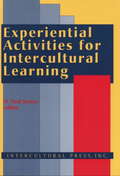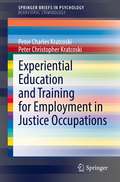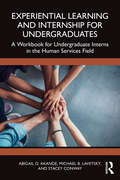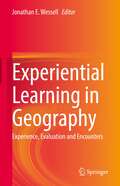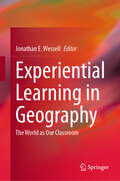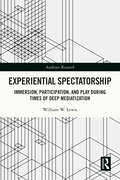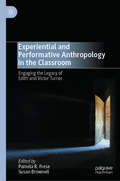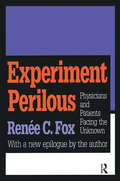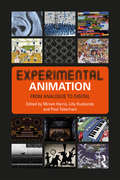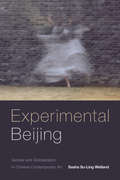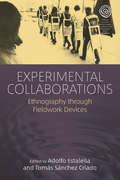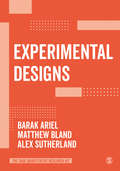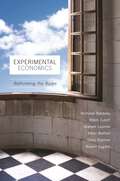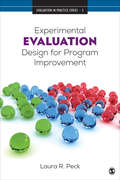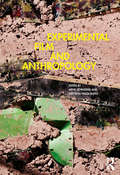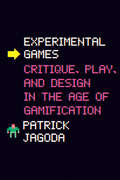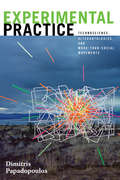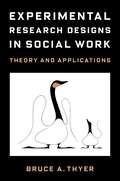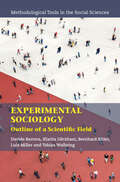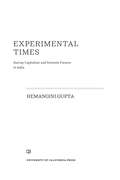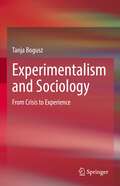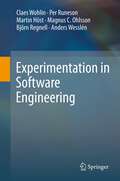- Table View
- List View
Experiential Activities for Intercultural Learning
by H. Ned SeelyeThe need for new approaches, methods, and techniques in cross-cultural training and intercultural education are virtually insatiable, especially for experiential activities. The emphasis in this book is on activities that foster the development of intercultural awareness and cross-cultural sensitivity, helping learners understand some of the principal dimensions of intercultural communication, cross-cultural human relations, and cultural diversity. The selections include simulations, case studies, role plays, critical incidents, and individual and group exercises. A number address relatively complex workplace issues; others focus on intercultural dynamics in educational contexts. Some are printed here for the first time; others are culled from less accessible sources. They range from basic introductory activities to those that facilitate the exploration of intercultural issues in significant depth. In an introductory essay, Sheila Ramsey, an experienced scholar and trainer, examines the nature of intercultural training and lays out a conceptual framework for assessing its effectiveness. The rest of the book is made up of activities organized around six facets of intercultural contact: cultural differences for beginners, understanding oneself as a cultural person, the intercultural perspective, working across cultures, cross-cultural “foul-ups,” and returning home. Each section opens with an introduction, followed by activities. Each activity includes, at a minimum, objectives, audience, materials required, setting, time required, and procedure for facilitation. Many of the activities include handouts or illustrations. This book will be especially valuable for trainers and educators who want to further ground their work in a solid theoretical base and at he same time augment their resources to expand heir repertoire.
Experiential Education and Training for Employment in Justice Occupations (SpringerBriefs in Psychology)
by Peter Christopher Kratcoski Peter Charles KratcoskiThis brief discusses the benefits and various considerations for participants and justice agencies involved in experiential programs for students. Using case studies and interviews with justice agency administrators, it assesses programs in law enforcement, courts, corrections, and public and private human services agencies. Each chapter discusses how to prepare for the internship, the expectations of the field work, and practical concerns. This brief is appropriate for students in justice studies, criminology and related programs, and for professionals coordinating experiential education.
Experiential Learning and Internship for Undergraduates: A Workbook for Undergraduate Interns in the Human Services Field
by Abigail O. Akande Michael B. Lavetsky Stacey ConwayThis textbook is a comprehensive and sequential guide designed specifically for undergraduate students entering internships in the human services field and for the faculty serving as their internship supervisors. With a strong focus on career development and self-exploration, it builds understanding of the theoretical knowledge and core competencies needed for practical, clinical experience in a variety of human services positions such as rehabilitation, social work, case management, counseling, and criminal justice.Through a variety of exercises and activities in an effective workbook format, this book assists student interns in developing a better sense of self in relation to their career readiness and helps them to identify career paths in the human services field. It goes on to support them in developing the soft skills necessary to navigate professional careers and gives guidance on how to secure undergraduate internships in the human services field. The book focuses on how to develop the tools needed to succeed, from counseling skills, case management, and crisis management to ethical conduct, multicultural considerations, self-care, legislation, and working under supervision. It is accompanied by downloadable versions of all the exercises and activities which will be available for instructors using this book as a course text.By targeting the career exploration content that is vital in the experience of undergraduates who are seeking professions in such a broad human services field, it will be essential reading for students at this level. It is also a valuable resource for internship or practicum instructors in undergraduate programs, with a focus on rehabilitation, human services, social work, psychology, criminal justice, and other related helping fields.
Experiential Learning in Geography: Experience, Evaluation and Encounters
by Jonathan E. WessellThis book provides insight into the importance and impacts that experiential learning has in geographic education by examining the experience, the methods of evaluation, and the encounters that students have shared about their experiences. It allows the reader to gain insight into what it really takes to prepare and lead students in such experiences both domestically and internationally. The book can be used as a guide to planning, but also demonstrates the use of experiential learning theory throughout these experiences and especially the importance of reflection by the students on what they are experiencing. The book is beneficial to students and faculty alike that are studying geography education.
Experiential Learning in Geography: The World as Our Classroom
by Jonathan E. WessellThis book provides insight into the importance and impacts that experiential learning has in geographic education. Like the first book on experiential learning in geography, this volume uses the same three areas, experience, evaluation and encounters, as a guide, but broadens the examination by looking at many different types of experiential learning. There are inherent differences in planning such experiences both domestically and internationally that become evident throughout the text. The book stresses the importance of reflection by the student in the learning process and can be used as a guide to planning. As such, this book is an essential read for students and faculty studying geography education.
Experiential Spectatorship: Immersion, Participation, and Play During Times of Deep Mediatization (Audience Research)
by William W. LewisExperiential Spectatorship offers a lens for analyzing audience experience with(in) a variety of contemporary media. Using a broad-based perspective, this media includes participatory theatre, video games, digital simulations, social media platforms, alternate reality games, choose your own adventure narratives, interactive television, and a variety of other experiential performance events. Through a taxonomy that includes Immersion, Participation, Game Play, and Role Play the book guides the reader to understand the ways mediatization and technics brought about by digital technologies are changing the capacities and expectations of contemporary audiences. In their daily interactions and relations with their technologies, they become mediatized spectators. By reading these technologies' impacts on individual subjectivity prior to acts of spectatorship, one gains the tools to best describe how the spectator creates forms of relational exchange with their experential media.This book prepares the reader to think in a digital manner so they can best recognize how performance and spectatorship in the twenty-first century are evolving to meet the needs of future waves of spectators brought up in a postdigital world.
Experiential and Performative Anthropology in the Classroom: Engaging the Legacy of Edith and Victor Turner
by Susan Brownell Pamela R. FreseThe contributors gathered here revitalize “ethnographic performance”—the performed recreation of ethnographic subject matter pioneered by Victor and Edith Turner and Richard Schechner—as a progressive pedagogy for the 21st century. They draw on their experiences in utilizing performances in a classroom setting to facilitate learning about the diversity of culture and ways of being in the world. The editors, themselves both students of Turner at the University of Virginia, and Richard Schechner share recollections of the Turners’ vision and set forth a humanistic pedagogical agenda for the future. A detailed appendix provides an implementation plan for ethnographic performances in the classroom.
Experiment Perilous: Physicians and Patients Facing the Unknown
by Renee C. Fox"This is a brilliant work of lasting value to both sociology and anthropology by a person combining the talent of keen observer with the highest level of theoretical sophistication. . . a major contribution to our understanding of the nature and structure of a significant social situation."--David M. Schneider, The University of Chicago. Experiment Perilous covers a three-year period In the lives of the patients and physicians in a small and intense hospital community. It represents a pioneering, participant-observation-based study of a hospital ward as a social system. In a new epilogue. Fox provides a historical and sociological account of phenomena relevant to clinical investigations that she has observed in her forty-five years as a sociologist of medicine.
Experimental Animation: From Analogue to Digital
by Miriam Harris Lilly Husbands Paul TaberhamExperimental Animation: From Analogue to Digital, focuses on both experimental animation’s deep roots in the twentieth century, and its current position in the twenty-first century media landscape. Each chapter incorporates a variety of theoretical lenses, including historical, materialist, phenomenological and scientific perspectives. Acknowledging that process is a fundamental operation underlining experimental practice, the book includes not only chapters by international academics, but also interviews with well-known experimental animation practitioners such as William Kentridge, Jodie Mack, Larry Cuba, Martha Colburn and Max Hattler. These interviews document both their creative process and thoughts about experimental animation’s ontology to give readers insight into contemporary practice. Global in its scope, the book features and discusses lesser known practitioners and unique case studies, offering both undergraduate and graduate students a collection of valuable contributions to film and animation studies.
Experimental Beijing: Gender and Globalization in Chinese Contemporary Art
by Sasha Su-Ling WellandDuring the lead-up to the 2008 Beijing Olympics, the censorious attitude that characterized China's post-1989 official response to contemporary art gave way to a new market-driven, culture industry valuation of art. Experimental artists who once struggled against state regulation of artistic expression found themselves being courted to advance China's international image. In Experimental Beijing Sasha Su-Ling Welland examines the interlocking power dynamics in this transformational moment and rapid rise of Chinese contemporary art into a global phenomenon. Drawing on ethnographic fieldwork and experience as a videographer and curator, Welland analyzes encounters between artists, curators, officials, and urban planners as they negotiated the social role of art and built new cultural institutions. Focusing on the contradictions and exclusions that emerged, Welland traces the complex gender politics involved and shows that feminist forms of art practice hold the potential to reshape consciousness, produce a nonnormative history of Chinese contemporary art, and imagine other, more just worlds.
Experimental Collaborations: Ethnography through Fieldwork Devices (EASA Series #34)
by Adolfo Estalella Tomás Sánchez CriadoIn the accounts compiled in this book, ethnography occurs through processes of material and social interventions that turn the field into a site for epistemic collaboration. Through creative interventions that unfold what we term as “fieldwork devices”—such as coproduced books, the circulation of repurposed data, co-organized events, authorization protocols, relational frictions, and social rhythms—anthropologists engage with their counterparts in the field in the construction of joint anthropological problematizations. In these situations, the traditional tropes of the fieldwork encounter (i.e. immersion and distance) give way to a narrative of intervention, where the aesthetics of collaboration in the production of knowledge substitutes or intermingles with participant observation. Building on this, the book proposes the concept of “experimental collaborations” to describe and conceptualize this distinctive ethnographic modality.
Experimental Criminology
by Anthony A. Braga Brandon C. Welsh Brandon C. Welsh Anthony A. Braga Gerben J. N. BruinsmaExperimental criminology is a part of a larger and increasingly expanding scientific research and evidence-based movement in social policy. The essays in this volume report on new and innovative contributions that experimental criminology is making to basic scientific knowledge and public policy. Contributors explore cutting-edge experimental and quasi-experimental methods and their application to important and topical issues in criminology and criminal justice, including neurological predictors of violence, peer influence on delinquency, routine activities and capable guardianship, early childhood prevention programs, hot spots policing, and correctional treatment for juvenile and adult offenders. It is the first book to examine the full scope of experimental criminology, from experimental tests - in the field and in the laboratory - of criminological theories and concepts to experimental and quasi-experimental evaluations of crime prevention and criminal justice interventions.
Experimental Designs (The SAGE Quantitative Research Kit)
by Alex Sutherland Barak Ariel Matthew P. BlandThe fourth book in The SAGE Quantitative Research Kit, this resource covers the basics of designing and conducting basic experiments, outlining the various types of experimental designs available to researchers, while providing step-by-step guidance on how to conduct your own experiment. As well as an in-depth discussion of Random Controlled Trials (RCTs), this text highlights effective alternatives to this method and includes practical steps on how to successfully adopt them. Topics include: · The advantages of randomisation · How to avoid common design pitfalls that reduce the validity of experiments · How to maintain controlled settings and pilot tests · How to conduct quasi-experiments when RCTs are not an option Practical and succintly written, this book will give you the know-how and confidence needed to succeed on your quantitative research journey.
Experimental Designs (The SAGE Quantitative Research Kit)
by Alex Sutherland Barak Ariel Matthew P. BlandThe fourth book in The SAGE Quantitative Research Kit, this resource covers the basics of designing and conducting basic experiments, outlining the various types of experimental designs available to researchers, while providing step-by-step guidance on how to conduct your own experiment. As well as an in-depth discussion of Random Controlled Trials (RCTs), this text highlights effective alternatives to this method and includes practical steps on how to successfully adopt them. Topics include: · The advantages of randomisation · How to avoid common design pitfalls that reduce the validity of experiments · How to maintain controlled settings and pilot tests · How to conduct quasi-experiments when RCTs are not an option Practical and succintly written, this book will give you the know-how and confidence needed to succeed on your quantitative research journey.
Experimental Economics: Rethinking the Rules
by Robert Sugden Nicholas Bardsley Robin Cubitt Graham Loomes Peter Moffatt Chris StarmerSince the 1980s, there has been explosive growth in the use of experimental methods in economics, leading to exciting developments in economic theory and policy. Despite this, the status of experimental economics remains controversial. In Experimental Economics, the authors draw on their experience and expertise in experimental economics, economic theory, the methodology of economics, philosophy of science, and the econometrics of experimental data to offer a balanced and integrated look at the nature and reliability of claims based on experimental research. The authors explore the history of experiments in economics, provide examples of different types of experiments, and show that the growing use of experimental methods is transforming economics into a genuinely empirical science. They explain that progress is being held back by an uncritical acceptance of folk wisdom regarding how experiments should be conducted, a failure to acknowledge that different objectives call for different approaches to experimental design, and a misplaced assumption that principles of good practice in theoretical modeling can be transferred directly to experimental design. Experimental Economics debates how such limitations might be overcome, and will interest practicing experimental economists, nonexperimental economists wanting to interpret experimental research, and philosophers of science concerned with the status of knowledge claims in economics.
Experimental Evaluation Design for Program Improvement (Evaluation in Practice Series #5)
by Laura R. PeckThe concepts of cause and effect are critical to the field of program evaluation. Experimentally-designed evaluations—those that randomize to treatment and control groups—offer a convincing means for establishing a causal connection between a program and its effects. Experimental Evaluation Design for Program Improvement considers a range of impact evaluation questions, particularly those questions that focus on the impact of specific aspects of a program. Laura R. Peck shows how a variety of experimental evaluation design options can provide answers to these questions, and she suggests opportunities for experiments to be applied in more varied settings and focused on program improvement efforts.
Experimental Evaluation Design for Program Improvement (Evaluation in Practice Series #5)
by Laura R. PeckThe concepts of cause and effect are critical to the field of program evaluation. Experimentally-designed evaluations—those that randomize to treatment and control groups—offer a convincing means for establishing a causal connection between a program and its effects. Experimental Evaluation Design for Program Improvement considers a range of impact evaluation questions, particularly those questions that focus on the impact of specific aspects of a program. Laura R. Peck shows how a variety of experimental evaluation design options can provide answers to these questions, and she suggests opportunities for experiments to be applied in more varied settings and focused on program improvement efforts.
Experimental Film and Anthropology (Criminal Practice Ser.)
by Arnd SchneiderExperimental Film and Anthropology urges a new dialogue between two seemingly separate fields. The book explores the practical and theoretical challenges arising from experimental film for anthropology, and vice versa, through a number of contact zones: trance, emotions and the senses, materiality and time, non-narrative content and montage. Experimental film and cinema are understood in this book as broad, inclusive categories covering many technical formats and historical traditions, to investigate the potential for new common practices. An international range of renowned anthropologists, film scholars and experimental film-makers engage in vibrant discussion and offer important new insights for all students and scholars involved in producing their own films. This is indispensable reading for students and scholars in a range of disciplines including anthropology, visual anthropology, visual culture and film and media studies.
Experimental Games: Critique, Play, and Design in the Age of Gamification
by Patrick JagodaIn our unprecedentedly networked world, games have come to occupy an important space in many of our everyday lives. Digital games alone engage an estimated 2.5 billion people worldwide as of 2020, and other forms of gaming, such as board games, role playing, escape rooms, and puzzles, command an ever-expanding audience. At the same time, “gamification”—the application of game mechanics to traditionally nongame spheres, such as personal health and fitness, shopping, habit tracking, and more—has imposed unprecedented levels of competition, repetition, and quantification on daily life. Drawing from his own experience as a game designer, Patrick Jagoda argues that games need not be synonymous with gamification. He studies experimental games that intervene in the neoliberal project from the inside out, examining a broad variety of mainstream and independent games, including StarCraft, Candy Crush Saga, Stardew Valley, Dys4ia, Braid, and Undertale. Beyond a diagnosis of gamification, Jagoda imagines ways that games can be experimental—not only in the sense of problem solving, but also the more nuanced notion of problem making that embraces the complexities of our digital present. The result is a game-changing book on the sociopolitical potential of this form of mass entertainment.
Experimental Practice: Technoscience, Alterontologies, and More-Than-Social Movements (Experimental Futures)
by Dimitris PapadopoulosIn Experimental Practice Dimitris Papadopoulos explores the potential for building new forms of political and social movements through the reconfiguration of the material conditions of existence. <P><P>Rather than targeting existing institutions in demands for social justice, Papadopoulos calls for the creation of alternative ontologies of everyday life that would transform the meanings of politics and justice. Inextricably linked to technoscience, these “alterontologies”—which Papadopoulos examines in a variety of contexts, from AIDS activism and the financialization of life to hacker communities and neuroscience—form the basis of ways of life that would embrace the more-than-social interdependence of the human and nonhuman worlds. <P><P>Speaking to a matrix of concerns about politics and justice, social movements, matter and ontology, everyday practice, technoscience, the production of knowledge, and the human and nonhuman, Papadopoulos suggests that the development of alterontologies would create more efficacious political and social organizing.
Experimental Research Designs in Social Work: Theory and Applications
by Bruce A. ThyerExperimental research is of great value to social work. Well-designed studies help social workers understand which approaches are most effective, with implications for both practice with individual clients and social policy more broadly. Many social work practitioners conduct studies that randomly assign clients to specific interventions and various control groups in order to assess policy outcomes. However, social work programs often do not teach experimental methods. Critics continue to assert that true experiments are impractical, unethical, or simply too blunt a tool to evaluate the effects of social work practices and policies.This book presents a comprehensive overview of the theory and practice of experimental research in the field of social work. Bruce A. Thyer describes the logic and design of experimental methods, helping readers understand the basics and then exploring increasingly complex and sophisticated research. He illustrates key principles through examples of how social workers have evaluated real-world practice approaches. The book considers recruitment and representation of marginalized groups, the ethical issues involved in the design and conduct of experiments, and how social work researchers can ensure that all participants in an experimental study benefit from effective care. An appendix contains a chronological listing of published studies authored by social workers who conducted experimental research. Accessible to social work undergraduate, graduate, and doctoral students alike and valuable for professionals from clinical workers to policy analysts, this book demonstrates the utility of experimental research across the entire spectrum of social work practice.
Experimental Sociology: Outline of a Scientific Field (Methodological Tools in the Social Sciences)
by Davide Barrera Klarita Gërxhani Bernhard Kittel Luis Miller Tobias WolbringExperiments have gained prominence in sociology in recent years. Increased interest in testing causal theories through experimental designs has ignited a debate about which experimental designs can facilitate scientific progress in sociology. This book discusses the implications of research interests for the design of experiments, identifies points of commonality and disagreement among the different perspectives within sociology, and elaborates on the rationales of each. It helps experimental sociologists find appropriate designs for answering specific research questions while alerting them to the challenges. Offering more than just a guide, this book explores both the historical roots of experimental sociology and the cutting-edge techniques of rigorous sociology. It concludes with a tantalizing peek into the future and provides a roadmap to the exciting prospects and uncharted territories of experimental sociology.
Experimental Times: Startup Capitalism and Feminist Futures in India
by Dr. Hemangini GuptaExperimental Times is an in-depth ethnography of the transformation of Bengaluru/Bangalore from a site of "backend" IT work to an aspirational global city of enterprise and innovation. The book journeys alongside the migrant workers, technologists, and entrepreneurs who shape and survive the dreams of a "Startup India" knitted through office work, at networking meetings and urban festivals, and across sites of leisure in the city. Tracking techno-futures that involve automation and impending precarity, Hemangini Gupta details the everyday forms of experimentation, care, and friendship that sustain and reproduce life and labor in India's current economy.
Experimentalism and Sociology: From Crisis to Experience
by Tanja BoguszThis book is based on the understanding that the diversity and heterogeneity of science and society are not only issue of critique, but engender experimental forms of collaboration. Building on John Dewey’s experimental theory of knowledge and inquiry, practice theory, science and technology studies and the anthropology of nature, the book offers a trenchant redefinition of a present-focused sociology as a science of experience in the spirit of experimentalism. Crisis, instead of being a mere problem, is understood as the baseline for creativity and innovation. Committed to the experimental pursuit, the book provides an experience-based methodological approach for an inter- and trans disciplinary sociology. Finally, it argues for a globalized and transformative sociological outreach beyond established epistemic and national borders. This book is of interest to sociologists and other social scientists pursuing experimentalism in theory, method and/or practice.
Experimentation in Software Engineering
by Per Runeson Martin Höst Björn Regnell Anders Wesslén Claes Wohlin Magnus C. OhlssonLike other sciences and engineering disciplines, software engineering requires a cycle of model building, experimentation, and learning. Experiments are valuable tools for all software engineers who are involved in evaluating and choosing between different methods, techniques, languages and tools. The purpose of Experimentation in Software Engineering is to introduce students, teachers, researchers, and practitioners to empirical studies in software engineering, using controlled experiments. The introduction to experimentation is provided through a process perspective, and the focus is on the steps that we have to go through to perform an experiment. The book is divided into three parts. The first part provides a background of theories and methods used in experimentation. Part II then devotes one chapter to each of the five experiment steps: scoping, planning, execution, analysis, and result presentation. Part III completes the presentation with two examples. Assignments and statistical material are provided in appendixes. Overall the book provides indispensable information regarding empirical studies in particular for experiments, but also for case studies, systematic literature reviews, and surveys. It is a revision of the authors' book, which was published in 2000. In addition, substantial new material, e.g. concerning systematic literature reviews and case study research, is introduced. The book is self-contained and it is suitable as a course book in undergraduate or graduate studies where the need for empirical studies in software engineering is stressed. Exercises and assignments are included to combine the more theoretical material with practical aspects. Researchers will also benefit from the book, learning more about how to conduct empirical studies, and likewise practitioners may use it as a "cookbook" when evaluating new methods or techniques before implementing them in their organization.
